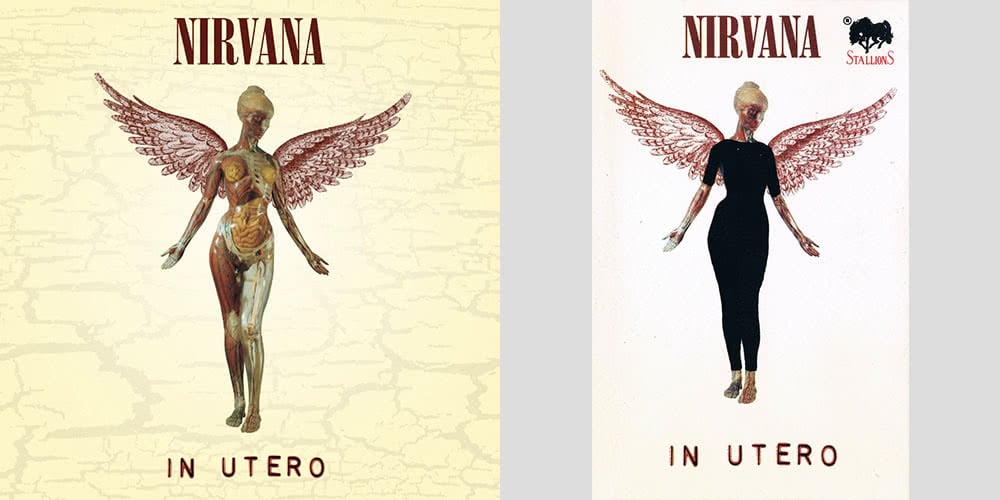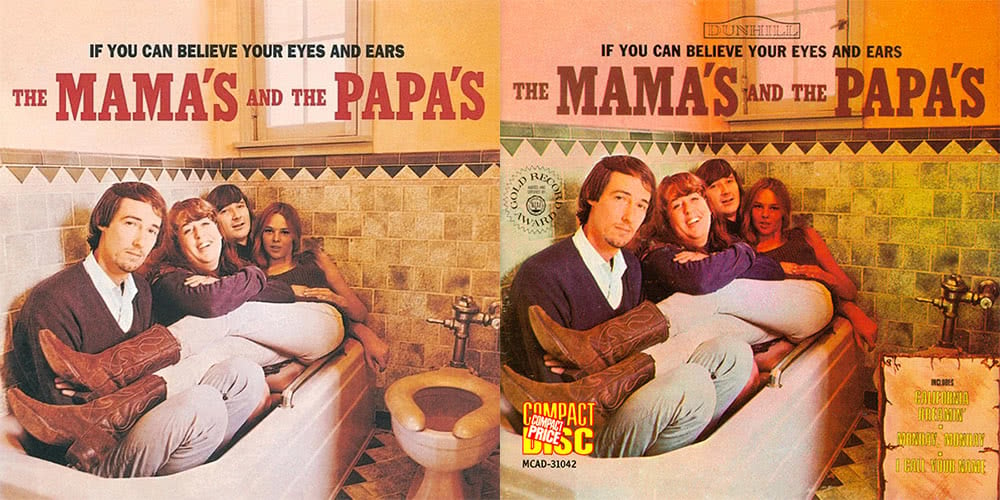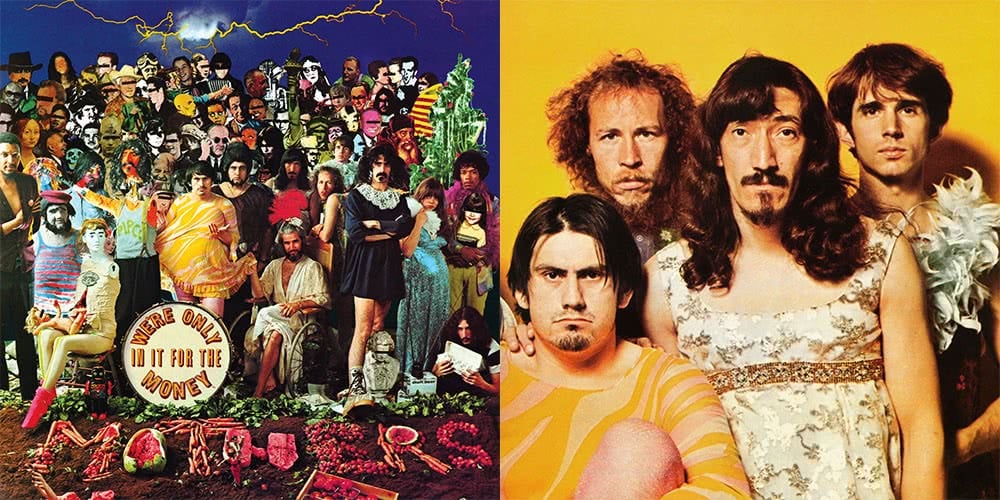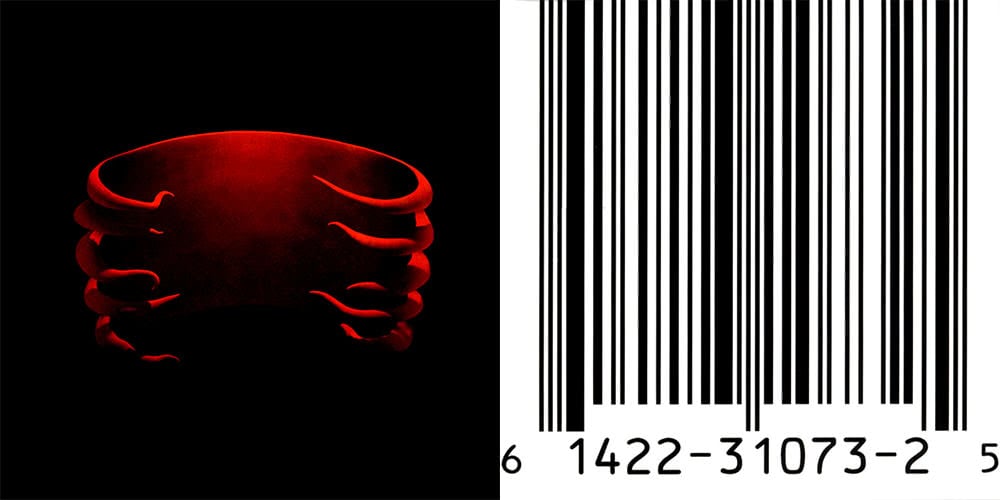Picking a good album cover can be a pretty hard job. Between attempting to use something that is eye-catching and representative of your image, it has to also pass by the censors if you want it to be seen by as many people as possible. These are some that didn’t make the cut do being ‘too controversial’.
While some bands like to make a point of being controversial and enjoy making their album covers as shocking as possible, plenty of other acts have released seemingly-innocent album covers that have become infamous for some rather ridiculous reason.
With that in mind, we’ve decided to take a look back through our eclectic record collections and dust off some of the records whose covers have alternative versions thanks to the powers that be. They might be offensive, or they might be in poor taste, but above all, they certainly displeased someone with a bit of power.
If you don’t see your favourite controversial cover here, don’t worry, this certainly won’t be the last time we take a look back at some of these infamous record sleeves.
Blink-182’s controversial Enema Of The State (1999)
Blink-182 had already attracted controversy early in their career by being forced to add the ‘182’ suffix as a result of legal action, but the album cover for 1999’s Enema Of The State was truly something else.
Recruiting porn star Janine Lindemulder to dress in a nurse uniform for the cover, the band were soon advised their album artwork was in violation of the Geneva Convention.
How, you ask? Well, since Blink-182 were “in no way a medical organisation”, they were told they weren’t allowed to use the Red Cross’ logo on the nurse’s cap without it being a crime against humanity. Rough stuff.
Love Classic Rock?
Get the latest Classic Rock news, features, updates and giveaways straight to your inbox Learn more

The Strokes controversial Is This It (2001)
When The Strokes’ debut record was released in 2001, it was adorned by one of the 21st century’s most iconic album covers.
Taken by photographer Colin Lane, who said he was “just trying to take a sexy picture” of his girlfriend, the album cover would well and truly help this young band turn heads everywhere they went.
In North America though, the band feared that a group of conservative retailers might protest the album’s cover, and decided to change it to a photograph of subatomic particle tracks in a bubble chamber.
While there’s talk that frontman Julian Casablancas wanted the revised cover to be the final artwork anyway, Colin Lane’s image was already at the printers, and remains something of an international exclusive to this day.

Nirvana controversial In Utero (1993)
If you’re not aware of the rules over in Saudi Arabia, women are required to cover up their faces and bodies in public. However, you might not have expected that this rule extends to matters of advertising, art, and music as well.
Back in 1993, Nirvana were a global smash in the alt-rock scene, and their final album In Utero was in high demand around the world.
Sadly, censors in Saudi Arabia took issue with the cover’s image of a Transparent Anatomical Manikin, and decided to make the image a bit more modest by covering it up with a black marker.

Christina Aguilera – Stripped (2002)
If you thought Nirvana’s censorship in Saudi Arabia was a bit wild, then spare a thought for poor Christina Aguilera.
Released during her somewhat rebellious period, Aguilera’s fourth album, Stripped, featured the singer wearing little more than a pair of jeans. As you could imagine, this caused problems for censors in Saudi Arabia.
To combat this, censors decided to make sure that Christina Aguilera was adorned with a black top, along with one of the most questionable fashion choices; some sort of denim dress.
While it wasn’t exactly the best Photoshop job we’ve seen, we have to give them kudos for producing one of the most unintentionally hilarious album covers of all time.

The Mamas And The Papas – If You Can Believe Your Eyes And Ears (1966)
Back in 1957, Leave It To Beaver gained notoriety for becoming one of the first television programs to show a bathroom. As you’d probably expect, almost a decade later, the general public would’ve been used to such outrageous scenes, right? Wrong.
When The Mamas & The Papas released their debut record, If You Can Believe Your Eyes And Ears, in 1966, the cover image featured the band sitting in a bathtub adjacent to a toilet.
Sadly, retailers believed this cover to be somewhat ‘obscene’, and alternative versions were quickly released featuring messages that promoted singles from the record instead.

The Mothers Of Invention – We’re Only In it For The Money (1968)
Frank Zappa’s The Mothers Of Invention were gearing up to release their third album, We’re Only In it For The Money, in 1967 when record labels intervened. With themes that satirised the hippie movement, the band decided to parody The Beatles’ Sgt. Pepper’s Lonely Hearts Club Band for the album cover.
After spending thousands on the photo shoot, and even recruiting Jimi Hendrix to take part, Zappa ran it by Paul McCartney, who seemed fine with it, but explained it was a matter for the record label, who weren’t pleased.
When the record was finally released in early 1968, the band’s record label decided to invert the front and inner artwork out of fear of being sued. As a result, the intended album cover now graces the inner sleeve of the record, and a photo of the band was instead promoted to the front, leaving The Mothers Of Invention rather unhappy with the whole thing.

The Offspring – The Offspring (1989)
Five years before they broke into the mainstream with Smash, The Offspring released an independent, self-titled effort that would pave the way for their future. However, unless you were lucky enough to score an original version of this loose classic, you might not have seen the artwork that adorned the first run of covers.
With a sleeve that features a xenomorph from Alien bursting out of a man’s chest, some retailers were reportedly shocked by the “grotesque” imagery and refused to stock it.
However, another story goes that the band were never actually fond of the cover to begin with, and welcomed the chance to reissue it with something far ore conservative in 1995.

The Rolling Stones – Sticky Fingers (1971)
Back in 1971, The Rolling Stones released Sticky Fingers, a record that is often cited as one of their best works. Famously, the record also featured some rather interesting packaging, with a working zipper included as part of the record’s Andy Warhol-designed cover.
As you’d imagine, this caused controversy, but not for the reason you’d expect.
Instead of Sticky Fingers attracting controversy due to its suggestive artwork, many retailers actually complained that the zipper on the cover was damaging records. As a result, the zipper was shipped partially unzipped, but this was just one of the sleeve’s controversies.
Over in Spain, the Franco regime took offence to the ‘obscene’ cover, and after a three-month delay, a new version was issued. This new cover was undoubtedly much more horrifying than the original, and featured a trio of fingers floating in a can of treacle.
A considerably rarer version of this classic record, it’s also one of the creepiest-looking covers in the Stones’ discography.

Slayer – God Hates Us All (2001)
Slayer’s God Hates Us All should be a case study in poor timing. Originally titled Soundtrack to the Apocalypse, the record was given its eventual title by a member of Pantera, and was seen as fitting by the band, given that the album touched on themes of religion and terrorism.
The record actually ended up being delayed for quite some time due to its controversial artwork, which featured a bible burnt with the band’s name, covered in blood, and impaled by nails in the shape of a pentagram.
Due to this rather notorious sleeve, some retailers decided instead to release the record with a much cheerier white cover, that featured four gold crosses.
As a result of this controversial artwork, the album ended up being delayed by two months and one day, eventually being released on September 11th, 2001. Considering the record’s title and themes of terrorism, it’s no stretch to say that even Slayer were left feeling a little uneasy about the album’s release.

Tool – Undertow (1993)
Back in 1992, Tool released their debut EP, Opiate. Bolstered by lead single ‘Hush’, the group quickly became known for their stance against censorship, and even appeared nude in their music video with tape over their mouths.
Needless to say, they weren’t too happy with what some retailers thought about the artwork for their debut record.
Released in 1993, the front artwork for Tool’s Undertow was accepted without issue, but when the folks at Kmart and Wal-Mart saw images of a nude men and women in the inner sleeve, along with pictures the band with pins in their heads, they weren’t pleased.
To combat this, Tool reissued a different version of the album, featuring nothing more than a barcode as the front cover.
Initial versions of this release also came with a note that explained the censorship, and offered fans to receive a free copy of the offending artwork.
“It came to our attention recently that many stores across our fine and open-minded country would not stock Undertow because of our explicit artwork”, the group explained.
“Although we loathe being censored, we want your money we still want you to hear out music, so we took it out.” Even when their art is censored, you can’t say that Tool don’t have a sense of humour.





































